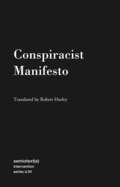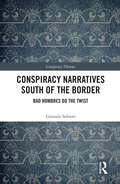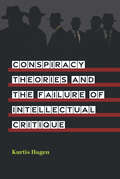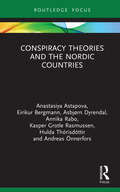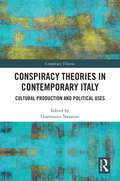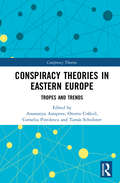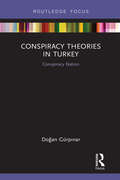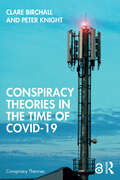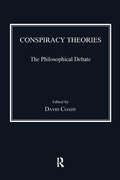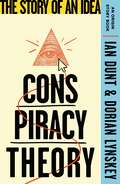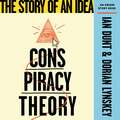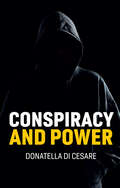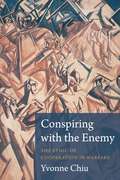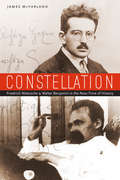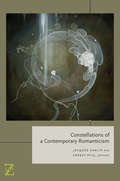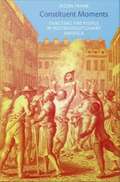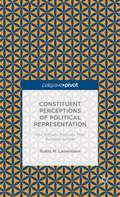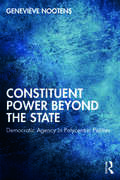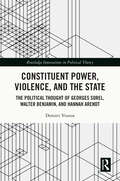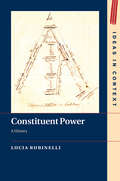- Table View
- List View
Conspiracist Manifesto
by AnonymousWhat if capitalism and its social machine were the outcome of a conspiratorial strategy?What if capitalism and its social machine were the outcome of a conspiratorial strategy? This anonymous book considers evidence that they must be that. Further, it argues in favor of passionate counter-conspiracies as the logical form of revolt in our time, when our very souls are said to be at stake.
Conspiracy Narratives South of the Border: Bad Hombres Do the Twist (Conspiracy Theories)
by Gonzalo SolteroThis book examines four conspiracy narratives from Mexico that push the boundaries of conspiracy research in a new direction. They include narratives about Lee Harvey Oswald's visit to Mexico City, shortly before he apparently assassinated JFK, and street gangs across borders and how some of our worst fears are projected into them. Mexico is a fertile terrain for conspiracy theories due to its complex social environment and its proximity to the United States, which not only made it a strategic platform during the Cold War but also today’s land of bad hombres that according to Donald Trump should be fended off with a wall. Conspiracy theories are always narrative in nature, telling us about the state of the world and the actors behind such states of affairs. This narrativity tends to be so enthralling that they have increasingly become the substance of entertainment and even politics. This volume analyses Mexican conspiracy narratives, explaining how they produce meaning in a variety of different social and political contexts. This book will be of interest to researchers of conspiracy theories, crime and its representations, Mexican politics and society, and US–Latin American relations.
Conspiracy Theories and the Failure of Intellectual Critique
by Kurtis HagenConspiracy Theories and the Failure of Intellectual Critique argues that conspiracy theories, including those that conflict with official accounts and suggest that prominent people in Western democracies have engaged in appalling behavior, should be taken seriously and judged on their merits and problems on a case-by-case basis. It builds on the philosophical work on this topic that has developed over the past quarter century, challenging some of it, but affirming the emerging consensus: each conspiracy theory ought to be judged on its particular merits and faults. The philosophical consensus contrasts starkly with what one finds in the social science literature. Kurtis Hagen argues that significant aspects of that literature, especially the psychological study of conspiracy theorists, has turned out to be flawed and misleading. Those flaws are not randomly directed; rather, they consistently serve to disparage conspiracy theorists unfairly. This suggests that there may be a bias against conspiracy theorists in the academy, skewing “scientific” results. Conspiracy Theories and the Failure of Intellectual Critique argues that social scientists who study conspiracy theories and/or conspiracy theorists would do well to better absorb the implications of the philosophical literature.
Conspiracy Theories and the Nordic Countries (Conspiracy Theories)
by Eirikur Bergmann Andreas Önnerfors Anastasiya Astapova Annika Rabo Asbjørn Dyrendal Kasper Grotle Rasmussen Hulda ThórisdóttirThis book explores the relevance of conspiracy theories in the modern social and political history of the Nordic Countries. The Nordic countries have traditionally imagined themselves as stable, wealthy, egalitarian welfare states. Conspiracy theories, mistrust and disunity, the argument goes, happened elsewhere in Europe (especially Eastern Europe), the Middle East or in the United States. This book paints a different picture by demonstrating that conspiracy theories have always existed in the Nordic region, both as a result of structural tensions between different groups and in the aftermath of traumatic events, but seem to have become more prominent over the last thirty or forty years. While the book covers events and developments in each of the Nordic countries (Sweden, Norway, Denmark, Iceland and Finland) it is not a comparative country analysis. Rather, the book focuses on conspiracy theories in and about the Nordic region as a region, arguing that similarities in the trajectories of conspiratorial thinking are interesting to examine in cultural, social and political terms. The book takes a thematic approach, including looking at states and elites; family, gender and sexuality; migration and the outside view on the Nordic region; conspiracy theories about the Nordic countries; and Nordic Noir. This book will be of great interest to researchers on extremism, conspiracy theories and the politics of the Nordic Countries.
Conspiracy Theories in Contemporary Italy: Cultural Production and Political Uses (Conspiracy Theories)
by Gianmarco NavariniThis volume explores the role played by conspiracy narratives in the contemporary Italian political, cultural, and social context, through a series of case studies.It begins with a historical and genealogical account of the troubled success of Italian conspiracy thinking from the early 1970s to the present day. Among the issues examined are the unclear division between legitimate/illegitimate forms of knowledge, the use of conspiracy as a confrontational discursive device, the emergence of moral panic, and the stabilization of information outlets against dominant official explanations. The analysis covers the case of a well-known national survey, and a digital platform specializing in conspiracy storytelling. The second axis of the book concerns the pervasive use of conspiracy as a theory or narrative that currently circulates in various Italian cultural fields: multiculturalism, immigration, and racism; Catholic traditionalism; football fandom; small business economics; and cooking and food.This volume will be of interest to researchers of conspiracy theories, and Italian politics and history.
Conspiracy Theories in Eastern Europe: Tropes and Trends (Conspiracy Theories)
by Anastasiya Astapova Onoriu 259 Cel Corneliu Pintilescu Tamás ScheibnerThis collection of state-of-the-art essays explores conspiracy cultures in post-socialist Eastern Europe, ranging from the nineteenth century to contemporary manifestations. Conspiracy theories about Freemasons, Communists and Jews, about the Chernobyl disaster, and about George Soros and the globalist elite have been particularly influential in Eastern Europe, but they have also been among the most prominent worldwide. This volume explores such conspiracy theories in the context of local Eastern European histories and discourses. The chapters identify four major factors that have influenced cultures of conspiracy in Eastern Europe: nationalism (including ethnocentrism and antisemitism), the socialist past, the transition period, and globalization. The research focuses on the impact of imperial legacies, nation-building, and the Cold War in the creation of conspiracy theories in Eastern Europe; the effects of the fall of the Iron Curtain and conspiracism in a new democratic setting; and manifestations of viral conspiracy theories in contemporary Eastern Europe and their worldwide circulation with the global rise of populism. Bringing together a diverse landscape of Eastern European conspiracism that is a result of repeated exchange with the "West," the book includes case studies that examine the history, legacy, and impact of conspiracy cultures of Bulgaria, Estonia, Hungary, Moldova, Poland, Romania, Russia, Slovakia, Ukraine, the former Yugoslav countries, and the former Soviet Union. The book will appeal to scholars and students of conspiracy theories, as well as those in the areas of political science, area studies, media studies, cultural studies, psychology, philosophy, and history, among others. Politicians, educators, and journalists will find this book a useful resource in countering disinformation in and about the region.
Conspiracy Theories in Turkey: Conspiracy Nation (Conspiracy Theories)
by Doğan GürpınarConspiracy theories are no longer just a curiosity for afficionados but a politically salient theme in the age of Trump, Brexit and "fake news". One of the countries that has been entrapped in conspiratorial visions is Turkey, and this book is the first comprehensive survey in English of the Turkish conspiratorial mind-set. It provides a nuanced overview of the discourses of Turkish conspiracy theorists and examines how these theorists argue for and legitimize their worldview. The author discusses a broad range of conspiracy theories, including some influenced by Kemalist and Islamist perspectives as well as those of the ruling Justice and Development Party. The most influential authors, books, references and images within the conspiracist milieu are all examined in detail. This book will be an important source for scholars interested in extremism in Turkey and the societal and political impact of conspiracy theories.
Conspiracy Theories in the Time of Covid-19 (Conspiracy Theories)
by Peter Knight Clare BirchallConspiracy Theories in the Time of Covid-19 provides a wide-ranging analysis of the emergence and development of conspiracy theories during the Covid-19 pandemic, with a focus on the US and the UK. The book combines digital methods analysis of large datasets assembled from social media with politically and culturally contextualised close readings informed by cultural studies. In contrast to other studies which often have an alarmist take on the "infodemic," it places Covid-19 conspiracy theories in a longer historical perspective. It also argues against the tendency to view conspiracy theories as merely evidence of a fringe or pathological way of thinking. Instead, the starting assumption is that conspiracy theories, including Covid-19 conspiracy theories, often reflect genuine and legitimate concerns, even if their factual claims are wide of the mark. The authors examine the nature and origins of the conspiracy theories that have emerged; the identity and rationale of those drawn to Covid-19 conspiracism; how these conspiracy theories fit within the wider political, economic and technological landscape of the online information environment; and proposed interventions from social media platforms and regulatory agencies. This book will appeal to anyone interested in conspiracy theories, misinformation, culture wars, social media, and contemporary society.
Conspiracy Theories in the Time of Covid-19 (Conspiracy Theories)
by Peter Knight Clare BirchallConspiracy Theories in the Time of Covid-19 provides a wide-ranging analysis of the emergence and development of conspiracy theories during the Covid-19 pandemic, with a focus on the US and the UK.The book combines digital methods analysis of large datasets assembled from social media with politically and culturally contextualised close readings informed by cultural studies. In contrast to other studies which often have an alarmist take on the "infodemic," it places Covid-19 conspiracy theories in a longer historical perspective. It also argues against the tendency to view conspiracy theories as merely evidence of a fringe or pathological way of thinking. Instead, the starting assumption is that conspiracy theories, including Covid-19 conspiracy theories, often reflect genuine and legitimate concerns, even if their factual claims are wide of the mark. The authors examine the nature and origins of the conspiracy theories that have emerged; the identity and rationale of those drawn to Covid-19 conspiracism; how these conspiracy theories fit within the wider political, economic and technological landscape of the online information environment; and proposed interventions from social media platforms and regulatory agencies.This book will appeal to anyone interested in conspiracy theories, misinformation, culture wars, social media and contemporary society.The Open Access version of this book, available at http://www.taylorfrancis.com, has been made available under a Creative Commons Attribution (CC-BY) 4.0 license.
Conspiracy Theories: The Philosophical Debate
by David CoadyConspiracy theories have a bad reputation. In the past, most philosophers have ignored the topic, vaguely supposing that conspiracy theories are obviously irrational and that they can be easily dismissed. The current philosophical interest in the subject results from a realisation that this is not so. Some philosophers have taken up the challenge of identifying and explaining the flaws of conspiracy theories. Other philosophers have argued that conspiracy theories do not deserve their bad reputation, and that conspiracy theorists do not deserve their reputation for irrationality. This book represents both sides of this important debate. Aimed at a broad philosophical community, including epistemologists, political philosophers, and philosophers of history. It represents a significant contribution to the growing interdisciplinary debate about conspiracy theories.
Conspiracy Theory: The Story of an Idea (An Origin Story Book) (An Origin Story Book)
by Dorian Lynskey Ian DuntAN ORIGIN STORY BOOK'Provides clarity, scholarship, wit and essential insight into why our world is the way it is' Adam Rutherford'I wish I could make Ian and Dorian's work mandatory' Sathnam SangheraWhat makes people believe in conspiracy theories? Why have they taken over our political sphere? And how do we counter them before it's too late?The world has always had conspiracy theories. From the Illuminati to the deep state, the JFK assassination to the death of Princess Diana - there have always been those who believe that events are manipulated by shadowy forces with sinister intent. But in recent years, conspiracism has colonised the mainstream. These days, it is a booming industry, a political strategy and a pseudo-religion - and it's threatening the foundations of liberal democracy.Where once political battles were fought over ideas and values, it now feels as though we're arguing over the nature of reality itself. The problem is bigger than lizard people or UFOs: left unchecked, conspiracy theories have the power to warp the fabric of society and justify unspeakable crimes.In Conspiracy Theory: The Story of an Idea, Ian Dunt and Dorian Lynskey pull back the curtain on conspiracy theories: where they come from, who promotes them, how they work and what they're doing to us. From biblical myth to online hysteria, this book explains what happens when the human gift for storytelling goes wrong - and how we might restore our common reality.
Conspiracy Theory: The Story of an Idea (An Origin Story Book) (An Origin Story Book)
by Dorian Lynskey Ian DuntAN ORIGIN STORY BOOK'Provides clarity, scholarship, wit and essential insight into why our world is the way it is' Adam Rutherford'I wish I could make Ian and Dorian's work mandatory' Sathnam SangheraWhat makes people believe in conspiracy theories? Why have they taken over our political sphere? And how do we counter them before it's too late?The world has always had conspiracy theories. From the Illuminati to the deep state, the JFK assassination to the death of Princess Diana - there have always been those who believe that events are manipulated by shadowy forces with sinister intent. But in recent years, conspiracism has colonised the mainstream. These days, it is a booming industry, a political strategy and a pseudo-religion - and it's threatening the foundations of liberal democracy.Where once political battles were fought over ideas and values, it now feels as though we're arguing over the nature of reality itself. The problem is bigger than lizard people or UFOs: left unchecked, conspiracy theories have the power to warp the fabric of society and justify unspeakable crimes.In Conspiracy Theory: The Story of an Idea, Ian Dunt and Dorian Lynskey pull back the curtain on conspiracy theories: where they come from, who promotes them, how they work and what they're doing to us. From biblical myth to online hysteria, this book explains what happens when the human gift for storytelling goes wrong - and how we might restore our common reality.
Conspiracy Theory: The Story of an Idea (An Origin Story Book) (An Origin Story Book)
by Dorian Lynskey Ian DuntAN ORIGIN STORY BOOK'Provides clarity, scholarship, wit and essential insight into why our world is the way it is' Adam Rutherford'I wish I could make Ian and Dorian's work mandatory' Sathnam SangheraWhat makes people believe in conspiracy theories? Why have they taken over our political sphere? And how do we counter them before it's too late?The world has always had conspiracy theories. From the Illuminati to the deep state, the JFK assassination to the death of Princess Diana - there have always been those who believe that events are manipulated by shadowy forces with sinister intent. But in recent years, conspiracism has colonised the mainstream. These days, it is a booming industry, a political strategy and a pseudo-religion - and it's threatening the foundations of liberal democracy.Where once political battles were fought over ideas and values, it now feels as though we're arguing over the nature of reality itself. The problem is bigger than lizard people or UFOs: left unchecked, conspiracy theories have the power to warp the fabric of society and justify unspeakable crimes.In Conspiracy Theory: The Story of an Idea, Ian Dunt and Dorian Lynskey pull back the curtain on conspiracy theories: where they come from, who promotes them, how they work and what they're doing to us. From biblical myth to online hysteria, this book explains what happens when the human gift for storytelling goes wrong - and how we might restore our common reality.
Conspiracy and Power
by Donatella Di CesareConspiracy theories are neither delusions nor lies, neither simplistic fallacies nor psychological quirks: rather, they are a political problem. They are not so much about truth as about power. Rather than seeking to debunk conspiracy theories as the work of fringe groups and cranks, Donatella Di Cesare develops an original account that portrays conspiracy as the spectre of a shattered community. With the proliferation of conspiracy theories, the distrust of politics and politicians turns into a boundless and pervasive suspicion. Who is behind the scenes? Who is pulling the strings? The world, which seems increasingly confusing and impossible to read, must have a hidden side, a secret realm, that of the Deep State and the New World Order, where plans are hatched, information is gathered and thoughts are controlled. It is no longer a matter of a one-off plot or intrigue. Conspiracy is the very form in which citizens who feel condemned to a frustrating impotence, helpless before a techno-economic juggernaut, and manipulated by a faceless power relate to the world. This is why conspiracy, which exposes the emptiness of democracy, proves to be a fearsome weapon of mass depoliticisation.
Conspiring with the Enemy: The Ethic of Cooperation in Warfare
by Yvonne ChiuDespite the strong influence of just war theory in military law and practice, warfare is commonly considered devoid of morality. Yet even in the most horrific of human activities, there is frequent communication and cooperation between enemies. One remarkable example is the Christmas truce—unofficial ceasefires between German and English trenches in December 1914 in which soldiers even mingled in No Man’s Land.In Conspiring with the Enemy, Yvonne Chiu offers a new understanding of why and how enemies work together to constrain violence in warfare. Chiu argues that what she calls an ethic of cooperation is found in modern warfare to such an extent that it is often taken for granted. The importance of cooperation becomes especially clear when wartime ethics reach a gray area: To whom should the laws of war apply? Who qualifies as a combatant? Should guerrillas or terrorists receive protections? Fundamentally, Chiu shows, the norms of war rely on consensus on the existence and content of the laws of war. In a wide-ranging consideration of pivotal instances of cooperation, Chiu examines weapons bans, treatment of prisoners of war, and the Geneva Conventions, as well as the tensions between the ethic of cooperation and the pillars of just war theory. An original exploration of a crucial but overlooked phenomenon, Conspiring with the Enemy is a significant contribution to military ethics and political philosophy.
Constellation: Friedrich Nietzsche and Walter Benjamin in the Now-Time of History
by James McFarlandConstellation is the first extended exploration of the relationship between Walter Benjamin, the Weimar-era revolutionary cultural critic, and the radical philosopher Friedrich Nietzsche. The affinity between these noncontemporaneous thinkers serves as a limit case manifesting the precariousness and potentials of cultural transmission in a disillusioned present.In five chapters, Constellation presents the changing figure of Nietzsche as Benjamin encountered him: an inspiration to his student activism, an authority for his skeptical philology, a manifestation of his philosophical nihilism, a companion in his political exile, and ultimately a subversive collaborator in his efforts to think beyond the hopeless temporality—new and always the same—of the present moment in history.
Constellations of a Contemporary Romanticism (Lit Z)
by Jacques Khalip & Forest Pyle, editorsConstellations of a Contemporary Romanticism takes its title and point of departure from Walter Benjamin’s concept of the historical constellation, which puts both “contemporary” and “romanticism” in play as period designations and critical paradigms. Featuring fascinating and diverse contributions by an international roster of distinguished scholars working in and out of romanticism—from deconstruction to new historicism, from queer theory to postcolonial studies, from visual culture to biopolitics—this volume makes good on a central tenet of Benjamin’s conception of history: These critics “grasp the constellation” into which our “own era has formed with a definite earlier one.” Each of these essays approaches romanticism as a decisive and unexpired thought experiment that makes demands on and poses questions for our own time: What is the unlived of a contemporary romanticism? What has romanticism’s singular untimeliness bequeathed to futurity? What is romanticism’s contemporary “redemption value” for painting and politics, philosophy and film?
Constituent Moments: Enacting the People in Postrevolutionary America
by Jason FrankSince the American Revolution, there has been broad cultural consensus that "the people" are the only legitimate ground of public authority in the United States. For just as long, there has been disagreement over who the people are and how they should be represented or institutionally embodied. In Constituent Moments, Jason Frank explores this dilemma of authorization: the grounding of democratic legitimacy in an elusive notion of the people. Frank argues that the people are not a coherent or sanctioned collective. Instead, the people exist as an effect of successful claims to speak on their behalf; the power to speak in their name can be vindicated only retrospectively. The people, and democratic politics more broadly, emerge from the dynamic tension between popular politics and representation. They spring from what Frank calls "constituent moments," moments when claims to speak in the people's name are politically felicitous, even though those making such claims break from established rules and procedures for representing popular voice. Elaborating his theory of constituent moments, Frank focuses on specific historical instances when under-authorized individuals or associations seized the mantle of authority, and, by doing so, changed the inherited rules of authorization and produced new spaces and conditions for political representation. He looks at crowd actions such as parades, riots, and protests; the Democratic-Republican Societies of the 1790s; and the writings of Walt Whitman and Frederick Douglass. Frank demonstrates that the revolutionary establishment of the people is not a solitary event, but rather a series of micropolitical enactments, small dramas of self-authorization that take place in the informal contexts of crowd actions, political oratory, and literature as well as in the more formal settings of constitutional conventions and political associations.
Constituent Perceptions of Political Representation: How Citizens Evaluate Their Representatives
by Robin M. LauermannThis book examines the nature of representation in democracy, focusing specifically on the factors shaping constituent evaluations of the US House Representatives and the resulting implications for government.
Constituent Power Beyond the State: Democratic Agency in Polycentric Polities
by Geneviève NootensThe concept of constituent power plays a major part in modern political and legal theory— in how we think about the political. This book tackles the twofold issue of public authority and public autonomy in the modern conception of the political by analysing the notion of constituent power, its function in the modern political apparatus, and debates about its meaning and function in our own context. Focusing on contemporary debates on constitutionalism "beyond" the state, Geneviève Nootens assesses the prospects for recasting the notion of constituent power in a polycentric setting that challenges state sovereignty as embodying the autonomy of the political. She argues that constituent power belongs with the conceptual apparatus of a theory of government peculiar to a statist way of knowing, and being into, the world, and that it is too much dependent upon the statist framework for it to have critical purchase on the new mappings of public authority. Nootens stresses the critical need to frame public authority appropriately if we are to conceptualize a conception of collective political agency that can sustain public autonomy in the current era. Constituent Power Beyond the State will be of interest to students and scholars of political theory, democratic theory, law, and constitutionalism.
Constituent Power, Violence, and the State: The Political Thought of Georges Sorel, Walter Benjamin, and Hannah Arendt (Routledge Innovations in Political Theory)
by Dimitri VourosIn Constituent Power, Violence, and the State, Dimitri Vouros examines the question of political violence by placing the thought of Georges Sorel, Walter Benjamin, and Hannah Arendt in conversation with contemporary theories of sovereignty and constituent power.Vouros argues that the violence sustaining the modern state inhibits institutional accountability and derails constituent power. The paradox of modern law—which is both the expression of the people’s will but also alienated from them—sets the stage for political contestation. For Vouros, the multitude’s potentiality is actualized through either organized or spontaneous acts of resistance against state force. Antagonism is therefore a key element of the political and must be included in any theory of political agonism. A strong notion of constituent power ensures the integrity of the public sphere and the expansion of citizens’ political agency. Bringing all these ideas together is unique for this field of investigation.Accessible and engagingly written, Constituent Power, Violence, and the State is a must read for researchers in political theory and political philosophy. Critical legal studies scholars and social theorists will also profit from this book.
Constituent Power: A History (Ideas in Context #128)
by Lucia RubinelliFrom the French Revolution onwards, constituent power has been a key concept for thinking about the principle of popular power, and how it should be realised through the state and its institutions. Tracing the history of constituent power across five key moments - the French Revolution, nineteenth-century French politics, the Weimar Republic, post-WWII constitutionalism, and political philosophy in the 1960s - Lucia Rubinelli reconstructs and examines the history of the principle. She argues that, at any given time, constituent power offered an alternative understanding of the power of the people to those offered by ideas of sovereignty. Constituent Power: A History also examines how, in turn, these competing understandings of popular power resulted in different institutional structures and reflects on why contemporary political thought is so prone to conflating constituent power with sovereignty.
Constitution Making Under Occupation: The Politics of Imposed Revolution in Iraq
by Andrew AratoThe attempt in 2004 to draft an interim constitution in Iraq and the effort to enact a permanent one in 2005 were unintended outcomes of the American occupation, which first sought to impose a constitution by its agents. Andrew Arato is the first person to record this historic process and analyze its special problems. He compares the drafting of the Iraqi constitution to similar, externally imposed constitutional revolutions by the United States, especially in Japan and Germany, and identifies the political missteps that contributed to problems of learning and legitimacy.
Constitution Making Under Occupation: The Politics of Imposed Revolution in Iraq (Columbia Studies in Political Thought / Political History)
by Andrew AratoThe attempt in 2004 to draft an interim constitution in Iraq and the effort to enact a permanent one in 2005 were unintended outcomes of the American occupation, which first sought to impose a constitution by its agents. This two-stage constitution-making paradigm, implemented in a wholly unplanned move by the Iraqis and their American sponsors, formed a kind of compromise between the populist-democratic project of Shi'ite clerics and America's external interference. As long as it was used in a coherent and legitimate way, the method held promise. Unfortunately, the logic of external imposition and political exclusion compromised the negotiations. Andrew Arato is the first person to record this historic process and analyze its special problems. He compares the drafting of the Iraqi constitution to similar, externally imposed constitutional revolutions by the United States, especially in Japan and Germany, and identifies the political missteps that contributed to problems of learning and legitimacy. Instead of claiming that the right model of constitution making would have maintained stability in Iraq, Arato focuses on the fragile opportunity for democratization that was strengthened only slightly by the methods used to draft a constitution. Arato contends that this event would have benefited greatly from an overall framework of internationalization, and he argues that a better set of guidelines (rather than the obsolete Hague and Geneva regulations) should be followed in the future. With access to an extensive body of literature, Arato highlights the difficulty of exporting democracy to a country that opposes all such foreign designs and fundamentally disagrees on matters of political identity.
Constitution Making during State Building
by Joanne WallisHow can fragmented, divided societies that are not immediately compatible with centralised statehood best adjust to state structures? This book employs both comparative constitutional law and comparative politics, as it proposes the idea of a 'constituent process', whereby public participation in constitution making plays a positive role in state building. This can help to foster a sense of political community and produce a constitution that enhances the legitimacy and effectiveness of state institutions because a liberal-local hybrid can emerge to balance international liberal practices with local customary ones. This book represents a sustained attempt to examine the role that public participation has played during state building and the consequences it has had for the performance of the state. It is also the first attempt to conduct a detailed empirical study of the role played by the liberal-local-hybrid approach in state building.
